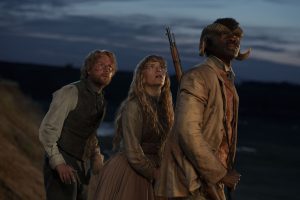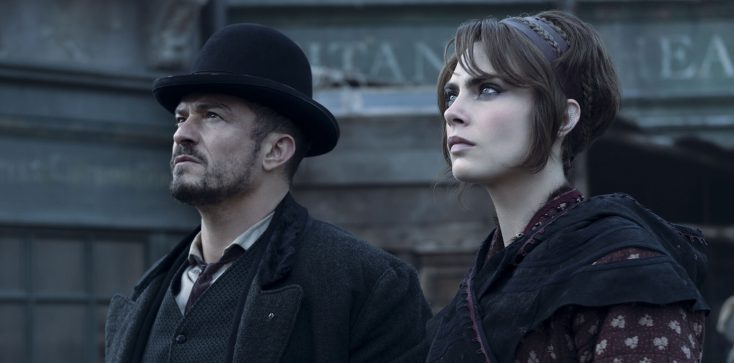
(2nd left to right) Tamzin Merchant and David Gyasi star in CARNIVAL ROW: THE FINAL SEASON. ©Amazon Content Services, LLC. CR: Julie Vrabelova.
By PETERSON GONZAGA
Front Row Features
HOLLYWOOD-For “Carnival Row” showrunner and executive producer Erik Oleson, season two had seen various changes during production due to the pandemic. It became a moment for the cast and crew to see production shut down and resume an additional covid crew.
During that time storylines also had changed. Season two of Amazon Prime’s “Carnival Row” picks up after the first season’s events, where we saw the tensions between the fae and the humans in the city of Burgue reach a boiling point. The second season explores the aftermath of the rebellion led by the fae and how it has affected the various characters.
Oleson recently talked about the excitement of the release of season two, the final season of “Carnival Row” on Amazon prime.
Peterson Gonzaga: How excited are you to see season two finally released on Amazon Prime?
Erik Oleson: It’s amazing. I started working on it four years ago. What happened? Oh, covid. So I’m very excited that it’s going up on Prime.
Gonzaga: You shot in the Czech Republic right?
Oleson: It’s an amazing place to film. I highly recommend it.
Gonzaga: Tell about season two. What difference will people see between the two seasons?
Oleson: I think they can expect every one of their favorite characters will have a juicy storyline that makes that character shine. We spent a lot of time making that come to pass. It’s a twisty turny rollercoaster ride of a story you don’t know what’s going to come next. It’s got fantasy elements. It’s got romantic elements. It’s got action. It’s got politics. It’s got intrigued. It’s got a lot of different elements working for it. But, it’s all organized around the central principle of a controlling idea for the screenwriting nerds who know what that means. The idea of or the storyline around the question of – Are we defined by our DNA or are we defined by what we do in life? How we make choices or take action and the question of what defines us as we’re living through a period of time where the folks are dividing themselves up into different groups or tribes of all different sorts of forces of division as the “Carnival Row” world did in the fantasy world. We started to explore the question of – How do you stand up to social injustice from one group against another? What’s the best way to take it on? Is it to fight back with love or fight back with hate? Is it better to change the world within the system or better to take up arms and take to the streets?
These are all the kinds of questions the characters of season two are going to explore with different answers to that same kind of organized questions.
Gonzaga: With characters like Imogen and her brother, can people take their situations and connect to it in the real world to their own lives?
Oleson: That’s the hope. When you’re a writer, the genre is a tool. Especially great fantasy and science-fiction have traditionally been a parable to real life. That’s science fiction at its best or fantasy at its best. You want it to resonate and be meaningful to the reader or to the viewer and make sure you’re saying something meaningful. The writers and I started in that place and say, “We’re about to spend a lot of Uncle Jeff’s money and better have something to say with it that makes sense and put something positive out there in that world so let’s make sure we’re starting there.”
Whether I’m doing a Marvel comic book hero show or a big lush fantasy epic that is on the scale of “Carnival Row,” it always starts with that question of “Why are we telling that story and then the writers and I spend months and years of our life telling the story, is it something we’re going to feel good about when we get to the end and we actually put something out that means something to the viewers and to people that they could say, “Oh. I never thought about it that way?” Something that resonates with their life.
Gonzaga: For you, especially working on this for four years with the up and downs and the coronavirus, what were the challenges you overcame?
Oleson: It was a giant logistical challenge. At one point, the crew was fifteen hundred people and keeping them safe and healthy was first and foremost on the minds of Legendary and Amazon, which was a huge challenge. It introduced a whole new Covid crew into production that we never had previously, It also shut us down for a moment. We had to pause production for a year. We were in the middle of filming. That was a big deal. We had to adjust the storylines. The fact that any television show makes it to air is a miracle to me because of all the moving parts. When you get to the end and it’s all stitched together this A-Team of fantastic craftspeople and an amazing cast but also everyone on the crew, some of them were Oscar nominees, Emmy winners, and A-listers, everybody stepped up.





